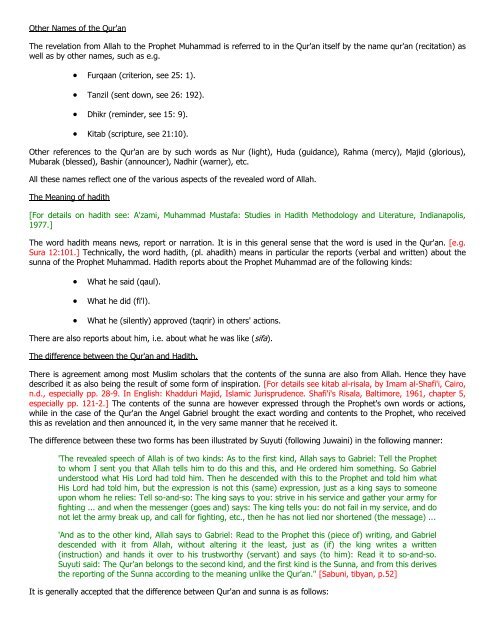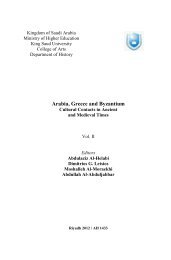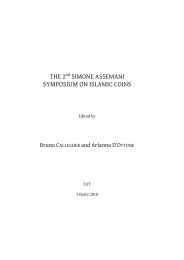ulum-al-quran
ulum-al-quran
ulum-al-quran
You also want an ePaper? Increase the reach of your titles
YUMPU automatically turns print PDFs into web optimized ePapers that Google loves.
Other Names of the Qur'an<br />
The revelation from Allah to the Prophet Muhammad is referred to in the Qur'an itself by the name qur'an (recitation) as<br />
well as by other names, such as e.g.<br />
Furqaan (criterion, see 25: 1).<br />
Tanzil (sent down, see 26: 192).<br />
Dhikr (reminder, see 15: 9).<br />
Kitab (scripture, see 21:10).<br />
Other references to the Qur'an are by such words as Nur (light), Huda (guidance), Rahma (mercy), Majid (glorious),<br />
Mubarak (blessed), Bashir (announcer), Nadhir (warner), etc.<br />
All these names reflect one of the various aspects of the reve<strong>al</strong>ed word of Allah.<br />
The Meaning of hadith<br />
[For details on hadith see: A'zami, Muhammad Mustafa: Studies in Hadith Methodology and Literature, Indianapolis,<br />
1977.]<br />
The word hadith means news, report or narration. It is in this gener<strong>al</strong> sense that the word is used in the Qur'an. [e.g.<br />
Sura 12:101.] Technic<strong>al</strong>ly, the word hadith, (pl. ahadith) means in particular the reports (verb<strong>al</strong> and written) about the<br />
sunna of the Prophet Muhammad. Hadith reports about the Prophet Muhammad are of the following kinds:<br />
<br />
<br />
<br />
What he said (qaul).<br />
What he did (fi'l).<br />
What he (silently) approved (taqrir) in others' actions.<br />
There are <strong>al</strong>so reports about him, i.e. about what he was like (sifa).<br />
The difference between the Qur'an and Hadith.<br />
There is agreement among most Muslim scholars that the contents of the sunna are <strong>al</strong>so from Allah. Hence they have<br />
described it as <strong>al</strong>so being the result of some form of inspiration. [For details see kitab <strong>al</strong>-ris<strong>al</strong>a, by Imam <strong>al</strong>-Shafi'i, Cairo,<br />
n.d., especi<strong>al</strong>ly pp. 28-9. In English: Khadduri Majid, Islamic Jurisprudence. Shafi'i's Ris<strong>al</strong>a, B<strong>al</strong>timore, 1961, chapter 5,<br />
especi<strong>al</strong>ly pp. 121-2.] The contents of the sunna are however expressed through the Prophet's own words or actions,<br />
while in the case of the Qur'an the Angel Gabriel brought the exact wording and contents to the Prophet, who received<br />
this as revelation and then announced it, in the very same manner that he received it.<br />
The difference between these two forms has been illustrated by Suyuti (following Juwaini) in the following manner:<br />
'The reve<strong>al</strong>ed speech of Allah is of two kinds: As to the first kind, Allah says to Gabriel: Tell the Prophet<br />
to whom I sent you that Allah tells him to do this and this, and He ordered him something. So Gabriel<br />
understood what His Lord had told him. Then he descended with this to the Prophet and told him what<br />
His Lord had told him, but the expression is not this (same) expression, just as a king says to someone<br />
upon whom he relies: Tell so-and-so: The king says to you: strive in his service and gather your army for<br />
fighting ... and when the messenger (goes and) says: The king tells you: do not fail in my service, and do<br />
not let the army break up, and c<strong>al</strong>l for fighting, etc., then he has not lied nor shortened (the message) ...<br />
'And as to the other kind, Allah says to Gabriel: Read to the Prophet this (piece of) writing, and Gabriel<br />
descended with it from Allah, without <strong>al</strong>tering it the least, just as (if) the king writes a written<br />
(instruction) and hands it over to his trustworthy (servant) and says (to him): Read it to so-and-so.<br />
Suyuti said: The Qur'an belongs to the second kind, and the first kind is the Sunna, and from this derives<br />
the reporting of the Sunna according to the meaning unlike the Qur'an." [Sabuni, tibyan, p.52]<br />
It is gener<strong>al</strong>ly accepted that the difference between Qur'an and sunna is as follows:





